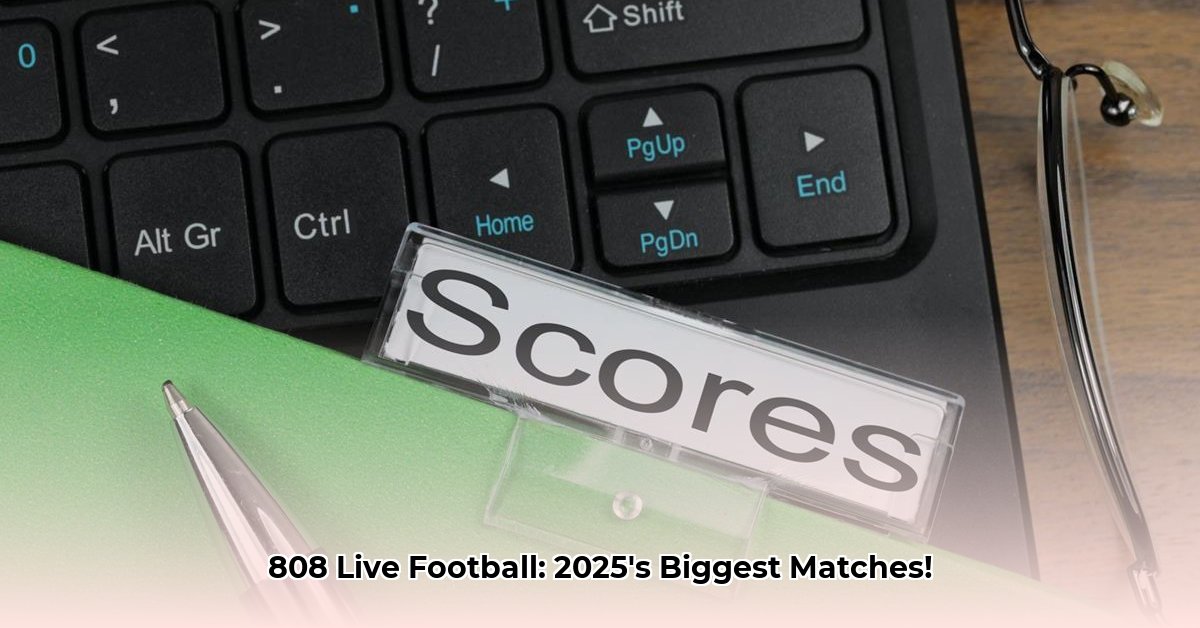
The Streaming Struggle: Finding Reliable Live Football in 2025
Finding a reliable stream for your favourite football match in 2025 can feel like a Sisyphean task. Many websites promising live action often fall short, leaving fans frustrated. This article examines the current state of online football streaming, using Score 808 as a case study. We'll compare it to successful platforms like LiveSoccerTV and explore the challenges of aggregating sports data. Whether you're a casual fan or a die-hard supporter, this is your guide to navigating the complexities of online football viewing.
The Wild West of Online Sports Data
Platforms like LiveSoccerTV demonstrate the potential of comprehensive sports data aggregation – a treasure trove of information for football enthusiasts. But this isn't the norm. Score 808, for instance, represents a stark contrast; our research revealed significant inconsistencies in its data. This highlights a critical issue in the online sports data landscape: the lack of readily available, reliable information. This isn't just about finding a working stream; it's about consistent access to accurate information, match statistics and player performance.
Is this a solvable problem? Absolutely crucial for the future of football statistics. What solutions could tackle this frustrating lack of data?
Data Aggregation Challenges: Why Finding Reliable Information is Difficult
The primary challenge lies in the scarcity of structured, easily accessible sports data. This makes it incredibly difficult for fans, analysts, and even governing bodies to accurately assess match details, trends, and player performance. Without this, how can we enhance fan engagement or develop sophisticated analytical tools? The potential for innovation is being significantly hampered by this data drought. To solve this, we need robust APIs (application programming interfaces – think of them as the digital doorways for data sharing) to deliver consistently accurate data. It's about building a solid foundation for data-driven innovations.
What concrete steps can be taken to improve data access for fans, sports analysts, and more?
The Impact on Stakeholders
The lack of reliable data affects several parties:
| Stakeholder | Impact |
|---|---|
| Stream Aggregators | Struggle to provide reliable services due to inconsistent data sources. |
| Sports News Websites | Face challenges in delivering timely and accurate information. |
| Fans | Experience frustration due to unreliable streams and inaccurate data. |
| Football Governing Bodies | Miss opportunities to enhance fan engagement and conduct thorough research. |
Navigating the Risks: A Risk Management Strategy
Navigating the risks associated with online football streaming requires a proactive risk management plan:
- Data Verification: Rigorous checks are crucial to ensure data accuracy.
- Multiple Sources: Relying on several data sources enhances reliability.
- Robust Technology: A stable and reliable website or app is essential.
- Enhanced Security: Prioritizing user data protection is paramount.
- Legal Compliance: Adherence to relevant laws and regulations is vital.
The Future of Score 808 and Similar Services
Collaboration is key. Data providers must prioritise accuracy and consistency, while football organizations should support initiatives to make data more widely accessible. This will ensure reliable streams and complete information for fans. It's not just about watching the game; it's about the broader access to information that's crucial for the future of football engagement. The need for improved data accessibility and standardization is clear.
Improving Data Accuracy for Niche Leagues: A Multi-pronged Approach
Live-streaming services like (hypothetical) Score 808 promise easy access, but what about niche leagues? How do we improve data accuracy for these often-overlooked competitions?
The Unique Challenges of Smaller Leagues
Gathering data for a national league differs greatly from covering under-resourced regional teams. Popular leagues have devoted teams; smaller ones often lack these resources. This affects fan engagement and sophisticated analytics. This data imbalance needs addressing. Imagine trying to build a detailed map of a huge city versus charting a tiny village – the scale vastly changes the challenges.
Where should we focus our efforts to improve information for fans of less-known leagues?
A Strategy for Enhanced Accuracy
Improving data accuracy for niche leagues requires a multi-pronged approach:
- Tech Investment: Automated tracking systems offer reliable, real-time data, especially crucial for smaller leagues with limited resources.
- Data Standardisation: Consistent data collection methods across all leagues ensures better comparability.
- Community Involvement: Empowering fans to contribute data enhances coverage, especially for obscure leagues.
- Data Validation: Cross-referencing information from multiple sources ensures accuracy.
- Collaborative Partnerships: Leagues can share resources and best practices for mutual benefit.
Sustainability: Maintaining Accuracy Over Time
Data accuracy is an ongoing process that demands:
- Continuous Training: Keeping data collectors up-to-date with technology and best practices.
- System Maintenance: Regular system upgrades are essential for data reliability.
- Continuous Evaluation: Regular monitoring and error correction are vital.
The benefits of improved data accuracy are multifaceted – driving better fan experiences, boosting league revenue, and providing enhanced insights for teams. It's an investment in the future of the sport.